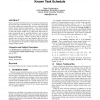Free Online Productivity Tools
i2Speak
i2Symbol
i2OCR
iTex2Img
iWeb2Print
iWeb2Shot
i2Type
iPdf2Split
iPdf2Merge
i2Bopomofo
i2Arabic
i2Style
i2Image
i2PDF
iLatex2Rtf
Sci2ools
101
click to vote
ICCAD
2006
IEEE
2006
IEEE
Energy budgeting for battery-powered sensors with a known task schedule
Battery-powered wireless sensors are severely constrained by the amount of the available energy. A method for computing the energy budget per sensing task can be a valuable design aid for sensor network optimizations. This work presents such a method that computes the upper and lower bounds on the task energy budget for a sensor node that must remain operational over a specified lifetime, with a known task schedule. These bounds take into account nonlinear changes in the battery voltage, capacity loss at high discharge rates, charge recovery, and capacity fade over time. We also propose efficient approximations replacing expensive calculations of the battery voltage while computing the energy budget bounds. Categories and Subject Descriptors C.4 [Performance of Systems]: Performance attributes; J.6 [Computer-Aided Engineering]: Computer-aided design (CAD) General Terms Design, Performance Keywords Low-power design, battery voltage modeling, energy bounds
| Added | 16 Mar 2010 |
| Updated | 16 Mar 2010 |
| Type | Conference |
| Year | 2006 |
| Where | ICCAD |
| Authors | Daler N. Rakhmatov |
Comments (0)

